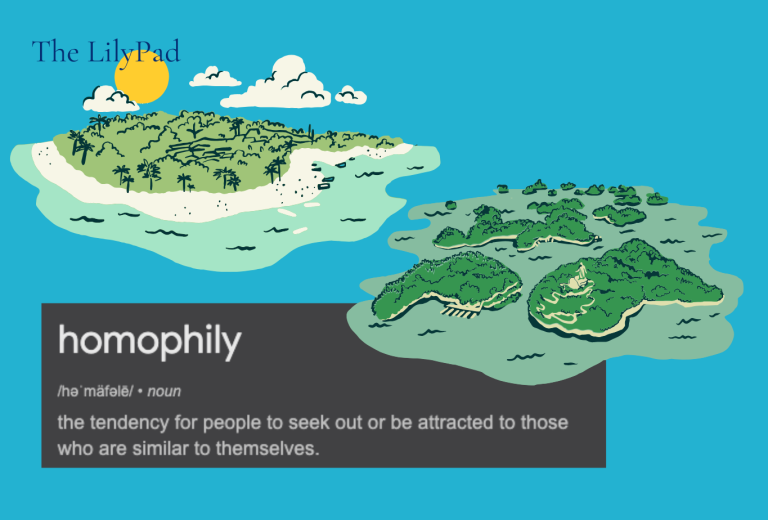Have you ever sat down in the cafeteria and realized the tables look like little islands? Each one is occupied by people who are almost identical in background or language. You’re not alone. I’ve noticed this both in and outside the classroom. What you’re seeing is called homophily—the tendency to stick with people who are similar to you.
While it may seem natural to most, I find this tendency at DKU not just concerning, but disturbing. Whether it’s due to culture, language, or taste in bubble tea, homophily has a way of bringing people together. But these cafeteria islands are such a missed opportunity. Imagine how much more dynamic DKU would be if we all made an effort to mix it up and create new connections, even if simply while eating lunch.
You might not see any harm in sticking around people you have things in common with. The ubiquity of homophily suggests that natural selection must have favored it: we are hardwired to gravitate toward what feels familiar. While it’s completely understandable as a coping mechanism, especially for freshmen new to university life, this tendency to retreat into familiar groups is harmful in the long run. The comfort that homophily offers is short-lived and can hinder us from fully embracing DKU’s diversity. Think of it as ordering from the same restaurant every single day. After a while, you’re really just missing out on some incredible food.
With a 70% Chinese and 30% international student body, the potential for cultural exchange is huge. Instead, I often see clusters of Chinese or international-only friend groups, with internationals even segregated by country. While international students are forced to speak English most of the time and have to learn how to navigate life by studying abroad in a foreign country, this at least coerces them to try to connect with other international students.
I believe this happened because a lot of us don’t care enough to make the effort to be more inclusive. On the contrary, I have witnessed people make conscious choices to avoid cross-cultural interactions. Sometimes, in international groups, people of the same background will speak their native language, even when someone in the group doesn’t understand it. It might seem harmless, but in a diverse setting, it’s alienating. If we can’t be considerate in these small ways, it’s no wonder that we struggle to bridge the larger cultural gaps. This tendency doesn’t just create awkwardness—it also sends a message that some people are more “in” than others, reinforcing exclusivity and ultimately discouraging people from mixing in the future.
I believe the habit of staying within our comfort zones is a form of self-limitation. It might feel easy and natural now, but that ease is deceptive. In the long term, it stops us from growing, from seeing ourselves and others in new ways, and from experiences that could broaden our perspectives. When we stay in our bubbles, we never get to prove those assumptions wrong.
I’m not suggesting that you should constantly switch your friend group every single week. But here’s the thing: homophily shrinks your world. It turns your experience at an international university into something that could happen anywhere. Eventually, it’s up to each of us to take small steps toward breaking these social defaults.
Next time you’re in the dining hall, invite someone who doesn’t share your first language or who you haven’t hung out with before. Join a club where you know no one, or grab coffee with that classmate you’ve never talked to. Classes are a perfect chance to get to know people you might not usually talk to by simply resisting the urge to form a group with your usual friends. You’ll find yourself surprised by how rewarding and fulfilling those interactions can be. You might even discover that we’re all more alike than we think!

